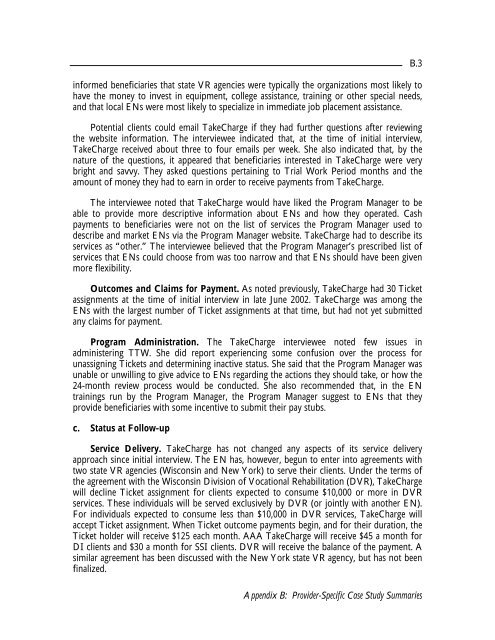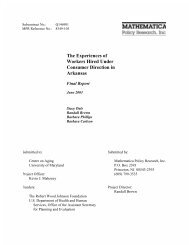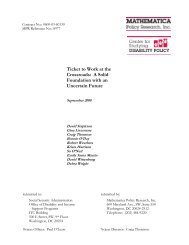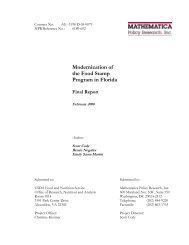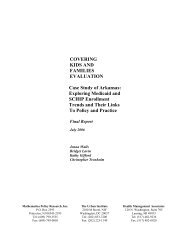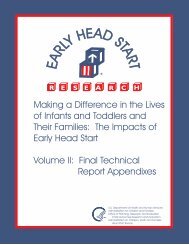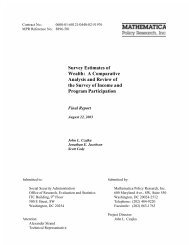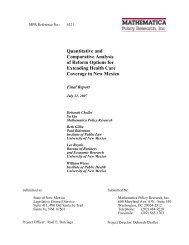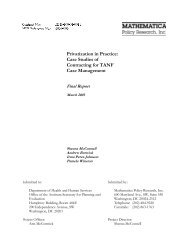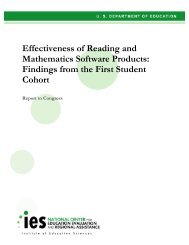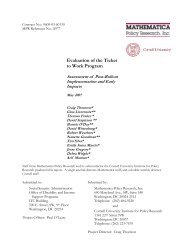Evaluation of the Ticket to Work Program Initial Evaluation Report
Evaluation of the Ticket to Work Program Initial Evaluation Report
Evaluation of the Ticket to Work Program Initial Evaluation Report
Create successful ePaper yourself
Turn your PDF publications into a flip-book with our unique Google optimized e-Paper software.
informed beneficiaries that state VR agencies were typically <strong>the</strong> organizations most likely <strong>to</strong><br />
have <strong>the</strong> money <strong>to</strong> invest in equipment, college assistance, training or o<strong>the</strong>r special needs,<br />
and that local ENs were most likely <strong>to</strong> specialize in immediate job placement assistance.<br />
Potential clients could email TakeCharge if <strong>the</strong>y had fur<strong>the</strong>r questions after reviewing<br />
<strong>the</strong> website information. The interviewee indicated that, at <strong>the</strong> time <strong>of</strong> initial interview,<br />
TakeCharge received about three <strong>to</strong> four emails per week. She also indicated that, by <strong>the</strong><br />
nature <strong>of</strong> <strong>the</strong> questions, it appeared that beneficiaries interested in TakeCharge were very<br />
bright and savvy. They asked questions pertaining <strong>to</strong> Trial <strong>Work</strong> Period months and <strong>the</strong><br />
amount <strong>of</strong> money <strong>the</strong>y had <strong>to</strong> earn in order <strong>to</strong> receive payments from TakeCharge.<br />
The interviewee noted that TakeCharge would have liked <strong>the</strong> <strong>Program</strong> Manager <strong>to</strong> be<br />
able <strong>to</strong> provide more descriptive information about ENs and how <strong>the</strong>y operated. Cash<br />
payments <strong>to</strong> beneficiaries were not on <strong>the</strong> list <strong>of</strong> services <strong>the</strong> <strong>Program</strong> Manager used <strong>to</strong><br />
describe and market ENs via <strong>the</strong> <strong>Program</strong> Manager website. TakeCharge had <strong>to</strong> describe its<br />
services as “o<strong>the</strong>r.” The interviewee believed that <strong>the</strong> <strong>Program</strong> Manager’s prescribed list <strong>of</strong><br />
services that ENs could choose from was <strong>to</strong>o narrow and that ENs should have been given<br />
more flexibility.<br />
Outcomes and Claims for Payment. As noted previously, TakeCharge had 30 <strong>Ticket</strong><br />
assignments at <strong>the</strong> time <strong>of</strong> initial interview in late June 2002. TakeCharge was among <strong>the</strong><br />
ENs with <strong>the</strong> largest number <strong>of</strong> <strong>Ticket</strong> assignments at that time, but had not yet submitted<br />
any claims for payment.<br />
<strong>Program</strong> Administration. The TakeCharge interviewee noted few issues in<br />
administering TTW. She did report experiencing some confusion over <strong>the</strong> process for<br />
unassigning <strong>Ticket</strong>s and determining inactive status. She said that <strong>the</strong> <strong>Program</strong> Manager was<br />
unable or unwilling <strong>to</strong> give advice <strong>to</strong> ENs regarding <strong>the</strong> actions <strong>the</strong>y should take, or how <strong>the</strong><br />
24-month review process would be conducted. She also recommended that, in <strong>the</strong> EN<br />
trainings run by <strong>the</strong> <strong>Program</strong> Manager, <strong>the</strong> <strong>Program</strong> Manager suggest <strong>to</strong> ENs that <strong>the</strong>y<br />
provide beneficiaries with some incentive <strong>to</strong> submit <strong>the</strong>ir pay stubs.<br />
c. Status at Follow-up<br />
Service Delivery. TakeCharge has not changed any aspects <strong>of</strong> its service delivery<br />
approach since initial interview. The EN has, however, begun <strong>to</strong> enter in<strong>to</strong> agreements with<br />
two state VR agencies (Wisconsin and New York) <strong>to</strong> serve <strong>the</strong>ir clients. Under <strong>the</strong> terms <strong>of</strong><br />
<strong>the</strong> agreement with <strong>the</strong> Wisconsin Division <strong>of</strong> Vocational Rehabilitation (DVR), TakeCharge<br />
will decline <strong>Ticket</strong> assignment for clients expected <strong>to</strong> consume $10,000 or more in DVR<br />
services. These individuals will be served exclusively by DVR (or jointly with ano<strong>the</strong>r EN).<br />
For individuals expected <strong>to</strong> consume less than $10,000 in DVR services, TakeCharge will<br />
accept <strong>Ticket</strong> assignment. When <strong>Ticket</strong> outcome payments begin, and for <strong>the</strong>ir duration, <strong>the</strong><br />
<strong>Ticket</strong> holder will receive $125 each month. AAA TakeCharge will receive $45 a month for<br />
DI clients and $30 a month for SSI clients. DVR will receive <strong>the</strong> balance <strong>of</strong> <strong>the</strong> payment. A<br />
similar agreement has been discussed with <strong>the</strong> New York state VR agency, but has not been<br />
finalized.<br />
B.3<br />
Appendix B: Provider-Specific Case Study Summaries


